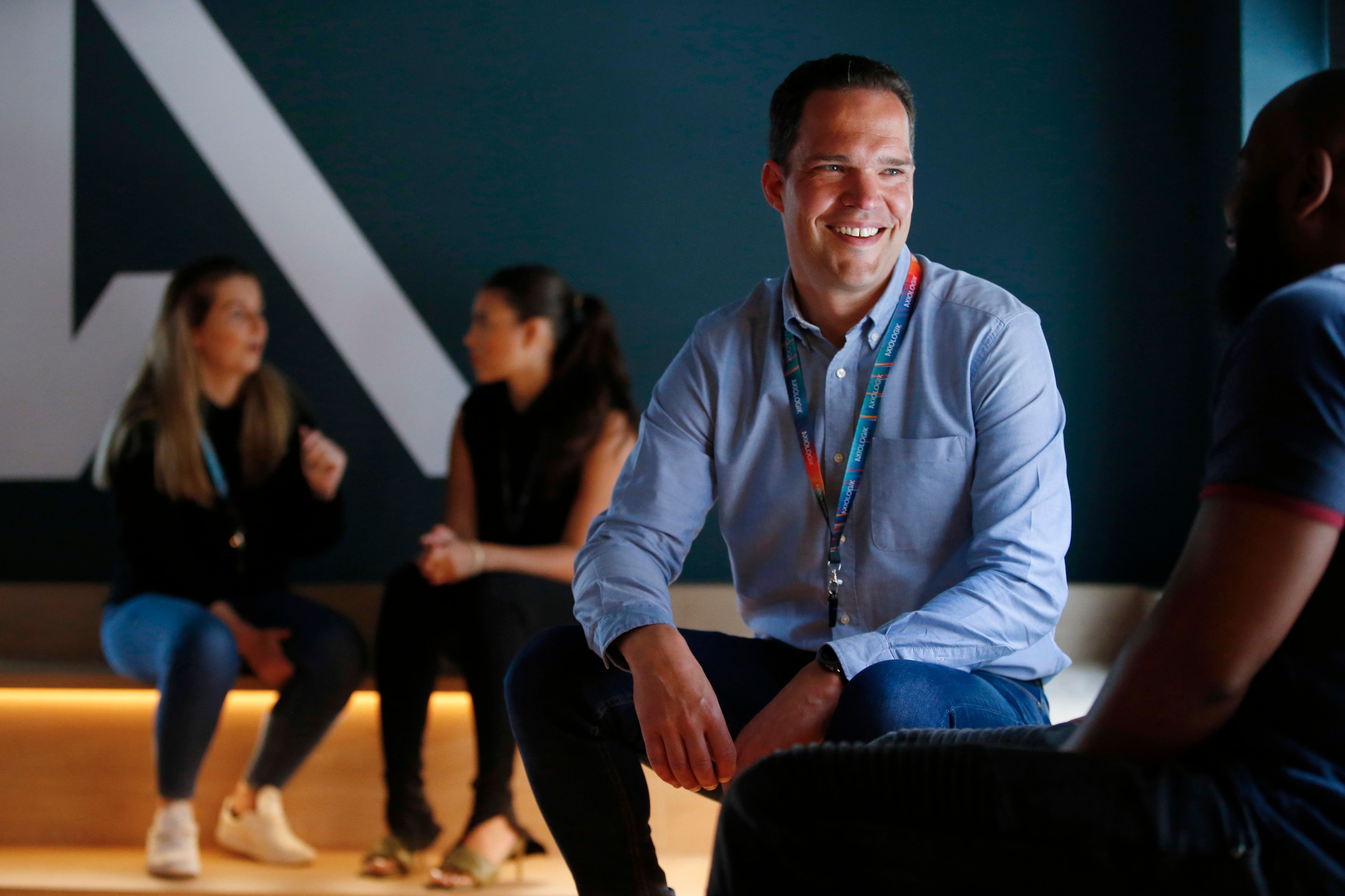Creating digital impact in regulated environments
Axiologik specialise in shaping, designing and delivering large scale digital agendas for financial organisations who have big ambitions
We help financial organisations focus on what really matters with a strategy
The right mix of product, people and technology is critical for the financial sector and the customer's it serves. The consequences of failure, whether data breach or ethical disaster are potentially catastrophic.
We help financial organisations focus on what really matters with a strategy that supercharges customer experience and retention whilst providing regulatory compliance and secure operating models.
Our years of financial brand expertise alongside a breadth of cross sector experience spanning government, retail, finance, health, and utilities support the discovery, design, creation and delivery of digital services that are secure by design, accessible, architected for sustainability and deliver competitive advantage.
WE HAVE A PROVEN TRACK RECORD WITH MAJOR SECTOR BRANDS
How we help financial organisations succeed
Maintaining high levels of resiliency to withstand ongoing change, shock and disruption is imperative for all Financial Services organisations. Major events including the 2008
financial crisis, and the Covid-19 global health crisis have bought financial and operational resilience up the agenda.
Unpredictable events such as cybercrime, hacking, digital attacks, failing infrastructure,
natural disasters and climate change have risen in recent years. These are risk factors
that can significantly impact the ability of an FS organisation to provide critical business
services and these are exacerbated by the fact that many organisations have legacy core banking and IT systems. Consequently,
effective operational and technological resilience are key to maintaining core banking
services through or despite of a disruption.
It is vital that organisations remain resilient in the presence of unrelenting change,
threat of disruptions and ubiquitous digital transformation.
We can help you build and demonstrate:
- Operational Resilience - by identifying and linking critical business services to capabilities and their enablers - people, processes, technologies, facilities, and 3rd parties – and ensuring that these elements are understood and continuously improved.
- Technological Resilience – by identifying and tackling challenges in the technology stack.
- Cloud Resilience – by advising on how to achieve and improve resiliency in cloud computing.
The Sustainable Development Goals (SDGs), also known as the Global Goals, were adopted by the United Nations in 2015 as a universal call to action to end poverty, protect the planet and ensure that by 2030 all people enjoy peace and prosperity. Banks are now emerging as major force in reaching the UN’s SDGs, with strong commitment to environmental, social and governance (ESG) priorities.
Although banking is not considered a polluting industry, the current scale of operations has considerably increased the carbon footprint of banks due to their massive use of energy, high paper wastage and lack of green buildings. This has led to sustainable banking (green or ethical banking), a relatively new initiative that seeks to balance economic growth with environmental and social responsibility including offsetting. The focus is an additional agenda towards protecting the environment and conserving natural resources. By integrating sustainability into their core operations, banks play a crucial role in driving positive change and reducing the carbon footprint from banking activities.
We can help Financial Services organisations reach their sustainability goals by adopting technology and products which result in substantial reduction of their carbon footprint as well as develop a sustainable business, for example by:
- Establishing short, medium and long-term IT sustainability goals and initiatives.
- Transforming IT by moving on-premises applications and document storage to the Cloud.
- Adopting new, more efficient software offerings.
- Modernising or optimising existing technologies.
- Improving adoption of digital channels and communication touchpoints.
There is so much to know about every customer - needs, wants, preferences, behaviours,
interactions, buying habits, past purchases, etc. Customer identity data, engagement data, behavioural data and attitudinal data are some of the most valuable data held by Financial Services organisations as when it comes to building customer value, providing
better customer experience and improving efficiency - customer insight is the ultimate
power.
One of the biggest challenges today is that Financial Services organisations use many
systems to hold customer data, systems such as e-mail, analytics, CRM, e-commerce and
social sites. Largely, these systems operate in silos and don’t pass data back and forth providing an incomplete picture.
With so many different types of customer data to collect, methods of collecting data and systems to store and analyse data, organisations constantly need to elevate their Customer Data &
Analytics capability by connecting their systems, evolving their data management processes and upskilling their staff to take advantage of new and existing data technologies.
Another big challenge faced by Financial Services organisations is balancing
personalisation with data privacy. On one hand, the information held on customers enables organisations to create more individualised customer experiences and interactions. On another, data privacy regulations protect customer data from unethical use. Balancing
personalisation and consumer privacy is key for trust.
With exciting new developments on the horizon such as Artificial Intelligence (AI) and Machine
Learning (ML) tailored experiences can meet the unique needs and preferences of their customers.
Advanced analytics and data visualisation tools are also trending due to their ability to
provide valuable insights into customer behaviour and preferences. These tools will increase in use driven by a desire to stand out from the competition and maximise efficiency. Advancements in AL, ML, Natural Language Processing (NLP), Augmented Reality (AR), Virtual Reality (VR), cloud-based analytics and predictive analytics.
We can help Financial Services organisations evolve their Data and Analytics
capability by:
- Assessing where organisations are up the personalisation maturity curve.
Defining personalisation strategies. - Improving data management processes.
- Embracing new personalisation technologies.
- Connecting systems and consolidating data.
- Advising on advanced analytics, predictive analytics, data visualisation tools and
cloud-based analytics.
Everyone can be vulnerable at different points in their lives. That vulnerability can be so wide ranging and driven by factors that could include:
- Health conditions such as physical disability, addiction or long-term illness.
- Life events like domestic abuse, bereavement or unemployment.
- Low resilience to deal with financial or emotional issues such as inadequate income or over-indebtedness.
- Limited capability and confidence in terms of managing money, literacy, numeracy or digital skills.
In vulnerable circumstances, people’s financial circumstances and a sense of wellbeing can often change rather abruptly. As a result, vulnerable customers may make poor financial decisions or mistakes that could have detrimental long-term effects. To empathise and achieve better outcomes for vulnerable customers, Financial Services organisations are building tailored products and solutions and embedding fair treatment of vulnerable customers in their culture, people, policies and processes.
We can support you to provide stand-out user experience and even better outcomes for vulnerable customers by:
- Designing website, mobile apps and other digital products that are simple, intuitive and accessible.
- Re-imaging customer-facing services and support processes with vulnerable customers in mind.
- Advising on harnessing modern AI-powered contact centre tools and technologies that monitor customer conversations and automatically detect signs of vulnerability, inform priority setting and route customers to the right person or team for fair treatment and optimum outcomes.
The need to manage the cost of existing and new technology is a common challenge across all industries, but comes with significant burden for those operating in complex, highly regulated sectors such as Financial Services. Our customers typically wish to prioritise investment in technology creating differentiating experiences, but their technology spend (which is becoming increasingly squeezed) is typically disproportionately needed to manage business as usual, supporting large legacy ecosystems and in turn slows the delivery of new digital products and services. Organisations also face increasing diversity and complexity in technology options available, the skills & competencies needed to effectively leverage that technology and the range of delivery partners available to help with mainstream, emerging and niche technology.
As organisations plan for these factors, these commonly surface as high cost to create or change services, increased time to value (i.e. slow delivery of desired benefits), high operating costs and weakened return on investment. These factors sit alongside the challenging opportunity cost decisions organisations are faced into balancing spend on business as usual vs more transformative digital services.
We provide support to financial services organisations to resolve these
challenges by:
- Identifying efficiencies in existing digital services
a. We ensure services make the best use of cloud platforms, optimising use of resources and leveraging tools to auto-scale or reduce cloud footprints reducing cost bases without
compromising on the quality of solutions
b. Designing and delivering services using cloud native capability alongside DevSecOps toolsets to reduce spend and time taken to deliver outcomes - De-duplication, consolidation and simplification
a. Assessing the current service landscape to identify opportunities to reduce the costs associated with operating large numbers of applications, including as part of a cloud
migration strategy
b. Re-engineering IT ecosystems to make better use of each component, increasing the use of platforms hosting multiple re-usable services along with technology enabling rapid
deployment of low-code solutions further reducing technology spend
Optimisation of delivery and partners
a. Adoption of optimal design an delivery techniques to ensure
the iterative delivery of critical capability in pared-down digital
services, reducing time to value and initial costs
b. Design of Lean delivery operating models embedding cost-
effective practices, with just-enough design, governance and rigour critical to safely realising the full range of spend optimisation activities.
CX in Financial Services refers to the quality of customers’ experiences and interactions with their FS provider. Every interaction impacts the customer’s perception of a brand and consequently, their loyalty to that brand. Emotionally charged interactions, when customers are reaching out to their FS provider at critical moments in their lives, often have the greatest influence on customer satisfaction. However routine interactions are just as important in shaping positive and lasting customer experiences.
According to Zendesk’s Customer Experience Trends Report 2023, customers have some
common expectations for the digital banking experience with 72% of customers wanting immediate service, 62% wanting personalise recommendations, and 70% of customers expecting anyone they interact with to have full context of their enquiry..
We can organisations that are falling behind to keep up with the fast, personalised, and seamless digital experiences that customers desire by providing support with:
- Setting an overall CX strategy and direction of travel.
- Omni-channel, deeper personalisation and modern CX technology
strategies. - Designing customer-facing services and experiences across both physical and digital channels.
- Implementing modern customer engagement and servicing platforms such as CRM, Contact Centre as a Service (CCaaS), AI-powered chatbots and messaging applications, AI-powered knowledge management technologies, customer analytics and data visualisation tools.
- Advising on appropriate Cloud services and CX technology integrations.
Spotlighting our financial team
Find out more about some of our financial team members, and gain an insight into why they love their role and how they can help you
 Leadership of Critical Change
Leadership of Critical Change Designing Exceptional Services
Designing Exceptional Services Digital Organisation Optimisation
Digital Organisation Optimisation Driving Engineering Excellence
Driving Engineering Excellence Service Ops Modernisation
Service Ops Modernisation Unlocking the Cloud
Unlocking the Cloud












